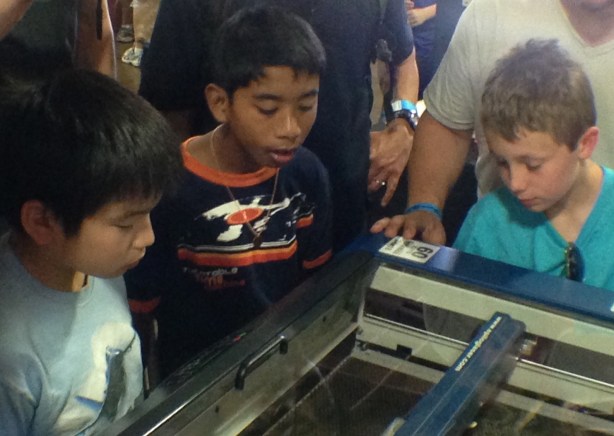

The bland-looking machines that lined the east wall of the Makerspace at Maker Faire did a good job of being entertaining throughout Maker Faire. They were constantly surrounded by kids watching them do all sorts of etching and inscribing tricks.
But the three machines — from ShopBot, Epilog, and Tormach — were there for another reason: they are the stalwart, entry-level tools that are helping to power the new industrial revolution: CNC routers and laser cutters.
Although the bulk of media attention has been grabbed by 3D printing, a huge percentage of the products that are manufactured and sold by small manufacturers are actually created using serious CNC milling machines and laser cutters. These are the unsung workhorse machines in hackerspaces around the world.
“The MakerBot is cute, but you can’t really sell many of the things that you create with it,” said Andy Grevstad, of Tormach, a firm that makes a line of powerful “personal CNC” machine that can mill metal. “At this point most of the consumer 3D printers are hobbyist machines.”
The guy who buys a Tormach unit, on the other hand, which sells for just under $7,000, “is ‘I’m going to quit my job’ serious,” said Andy Grevstad. “He, or she, is generally buying with the intent of doing a business.”
One aspect of these machines that makes them hard to understand: they are surprisingly versatile. Asked what one of these machines is best at, the usual response from a normally voluble company rep is: “That depends…” on what the new owner needs, or has thought up.
Many of the buyers of a Tormach CNC machine use it to create after-market parts for specialty markets: for owners of classic Jaguars and Vespas, for examples. A serious CNC machine is also good for robot parts.
Significantly, all three machines are used by 3D printer companies to create the housings and extruder heads that they need to manufacture their units.
According to Grevstad, “Our typical customer is the guy who does everything: he’s the designer, the manufacturer, and the sweeping-the-floor guy.”

All three machines also sell to schools, which is why they were in Maker Faire’s Hackerspace.
But the multiple uses of the machines were always hovering under the surface.
That was certainly the case at the ShopBot station. Kids were eagerly watching the creation of personalized woodcuts with robot images; many adults were apparently impressed by the sheer industrial power.
“The kids are interested in the personalized woodcuts,” said Randy Johnson, who was manning the ShopBot tool booth. “But often the moms and dads are saying, ‘I think there’s a business opportunity here.'”
ADVERTISEMENT





